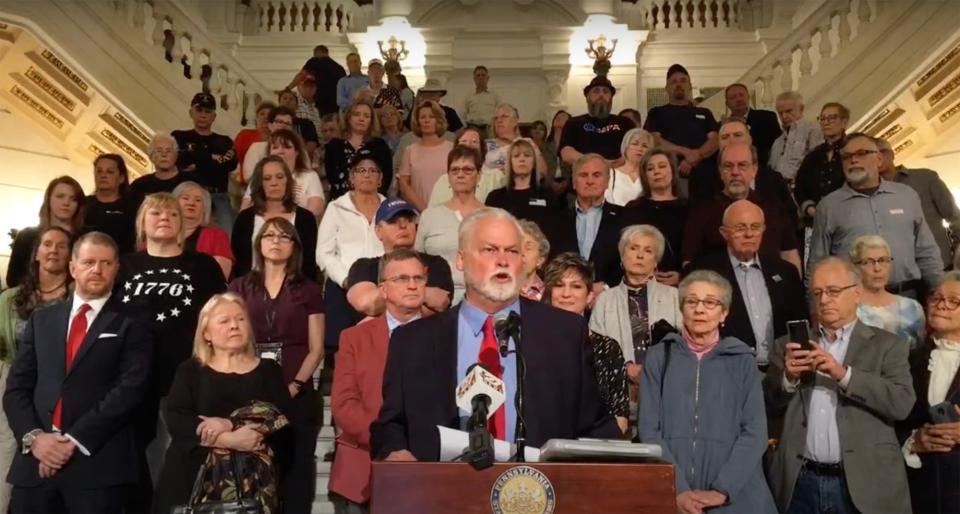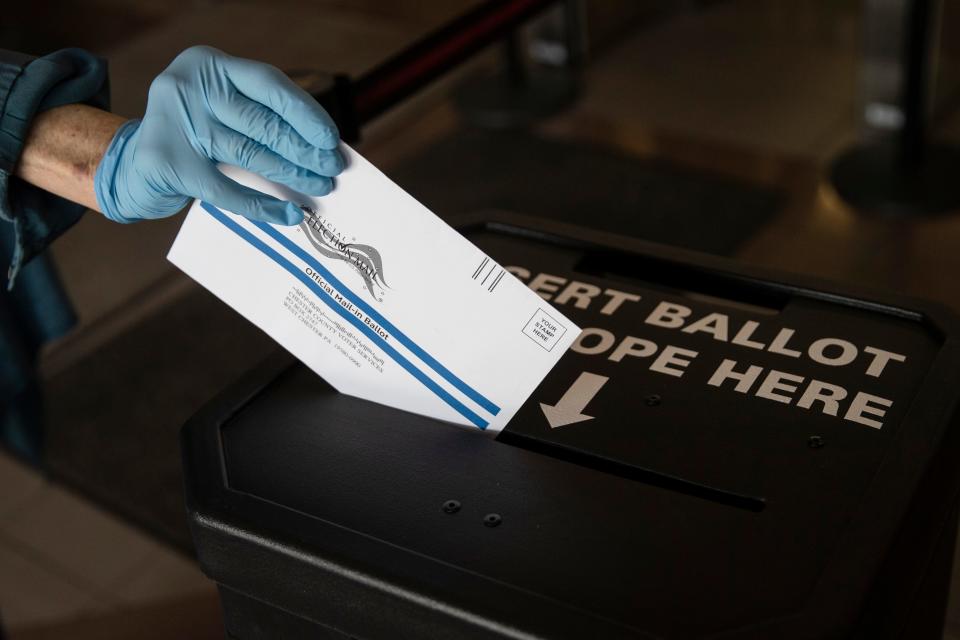After midterm losses, Pennsylvania Republicans warm up to 'ballot harvesting,' mail-in voting
MAGA Republicans in Pennsylvania often refer to the debunked conspiracy film “2000 Mules” to bolster their assertions that the 2020 election outcome was fraudulent.
Playing off former President Donald Trump's claims about widespread cheating, the movie asserts that nefarious political operatives, or “mules,” illegally collected ballots and stuffed drop boxes to help President Joe Biden capture victory.
But this month, GOP activist Scott Presler told Pennsylvania Republicans they must start embracing legal ballot collection and mail-in voting, the very systems that three years of election denial have convinced them to distrust.
“My argument is that each of us can become a mule," Presler said at a voter training session in Delaware County, one of several he led in the commonwealth in February. "I don’t want 2,000 mules. I want 2 million mules."
His support for legal ballot collection — which he believes could increase GOP voter turnout — echoes a broader messaging change among Republicans who are smarting from last year’s midterm losses and searching for lessons they can carry into this year’s election and the 2024 presidential contest.
These GOP figures haven’t abandoned their ultimate goal of banning mail-in voting or their opposition to ballot collection, pejoratively called "ballot harvesting." But they’re starting to say that, as long as these voting methods are allowed, their party must use them to win.
Even Bradford County Commissioner Doug McLinko, who spent more than a year battling in court to overturn Pennsylvania’s mail-in voting act, believes Republicans should take advantage of the law while it’s still in place.
“I’m not dumb,” he said in an interview. “We’re going to have to do the mail-in voting.”
While this new America First strategy means turning on Republican voters to mail voting, that effort might be exerting a lot of energy for little reward.
Roughly 5.3 million Pennsylvania voters cast a ballot for statewide races this past November, but the 2022 midterm saw the lowest rate of mail ballots cast compared to past elections. Just 1.2 million ballots, or 23%, cast in the gubernatorial race in November were from no-excuse mail-in ballots.
So it’s not clear how much this tactical change might help Republicans win future races, said Sarah Niebler, a political science professor at Dickinson College. In a state as competitive as Pennsylvania, almost anything can tip the balance in favor of one party or the other, and it’s often impossible to isolate any one factor as determinative, she said.
But Niebler said focusing on voting methods does enable Republicans to avoid introspection about their lackluster midterm showing.
“If a candidate thinks they lost because of their policy positions, then the path forward for them for a future candidacy is to change their policy positions,” she said. “If they think they lost or they can tell a story about why they lost because of a process, then they don’t have to consider the policy positions.”
Why the change of tune on mail-in voting?
Following the lead of former President Donald Trump, some Pennsylvania GOP leaders and activists have spent years sowing distrust about the commonwealth’s mail-in voting systems.
Attempts to erode faith in Pennsylvania's mail-in balloting might have contributed to the partisan schism in its use: Democrats accounted for roughly 63% of the 3.1 million mail ballots requested in the 2020 general election, while Republicans only accounted for 25% of them.
But now, some Republicans are saying their party’s insistence on in-person voting makes them vulnerable to Election Day problems, such as inclement weather, long lines and polling place snafus. In their view, this could be dampening GOP voter turnout compared to Democrats, whose embrace of mail-in voting gives them more flexibility about when and how to cast their ballots.
“We simply cannot allow the Democrats to continue to bank hundreds of thousands of votes before Election Day arrives,” state Rep. Russ Diamond, R-Lebanon, wrote in a late November blog post. “Voting by mail is legal, it will be legal for the foreseeable future, and if we reject it we do so at our own peril.”
More:PA Patriots Coalition teeing up America First candidates in local races
In the aftermath of the midterms, Sam Brancadora, chairman of the Berks County Patriots, also said the GOP needs to adopt the “Democrats’ playbook” when it comes to turning out the vote.
“Except for the cheating part,” he qualified.
State Sen. Doug Mastriano, a 2020 election denier who was defeated by now-Gov. Josh Shapiro in last year’s gubernatorial contest, also argued his party’s avoidance of mail-in voting is hurting its performance.
This new messaging is somewhat muddled, since it clings to past election fraud claims while also asserting that Republicans should try “legal” forms of the voting methods they’ve been decrying, according to Niebler.
“The natural follow-up question then is, OK, what do you mean when you say, ‘Let’s do ballot harvesting but in the legal way,’ or, ‘Let’s adopt the Democrats’ playbook for mail-in voting but without the cheating’?” she said.
Since no courts have found any evidence of widespread voter fraud in the 2020 election, the answer isn’t clear, she said.
Sam Faddis, head of UnitePA and a leader of the Pennsylvania Patriot Coalition, said he understands why Presler and even some in his own coalition are leaning into mail ballots, but the plan comes with drawbacks that could end up working against the “ultimate goal” of the Patriot Movement.
A network of grassroots groups largely made up of organizations that opposed coronavirus mitigation rules and supporters of stolen election claims, the Pennsylvania Patriot Coalition formed after Faddis organized an election integrity petition signing in Harrisburg last May.

The coalition and Faddis have made repealing Act 77, Pennsylvania's mail-in voting law, their goal since 2021, with Faddis saying Tuesday that it’s a vote method with “too many points of vulnerability.”
Faddis unveiled the broad goals of what the coalition called the You’re Fired Campaign to the Berks County Patriots in November. The centerpiece of that initiative being the replacement of Republican officials, who took no action to end mail-in voting since Act 77 was passed in 2019.
With Democrats favoring mail ballots far more than Republicans, Faddis said it makes sense why the pivot is coming up to increase voter participation.
“I recognize that it is probably reality that Republicans have to embrace that to a certain extent,” Faddis said.
Telling Republican voters to cast mail ballots, however, could end up making them more popular.
“If you’re going to say, ‘We have to accept mail-in voting in the short term,’ yes, there is a real danger that by doing so you ultimately are putting yourself in a position where you will never go back,” Faddis added.
Republicans also suggest ‘ballot harvesting’ tactics
While “ballot harvesting” has become synonymous with “voter fraud” in conservative circles, some Republicans have been trying to redeem the term in the wake of the November election.
Brancadora advocated for GOP ballot collection efforts in his post-midterm address to the Berks County Patriots. Presler did the same, while acknowledging that many people in his audience would have a visceral reaction against the idea.
Republicans, he contended, must employ every legal tool at their disposal to win races. He recently launched a super PAC, Early Vote Action, to encourage this “all-of-the-above” approach among GOP voters in swing states including Pennsylvania.
For instance, he explained, Pennsylvania does allow people to return ballots for someone who is disabled, as long as they follow legal guidelines.
The voter in these cases must sign a form naming someone as their “designated agent” — authorizing that person to pick up a ballot for them or return it on their behalf. By law, a person can’t serve as a designated agent for more than one individual with disabilities per election.
But Presler said that could still make a difference if adopted on a large scale.
"If each of you ballot harvested one legal vote, that doubles the amount of Republicans that are voting in elections," he told Republicans in Delaware County earlier this month.
Republicans who want to adopt ballot collection tactics insist they’re strictly adhering to the law, seeking to differentiate themselves from the Democrats they’ve baselessly accused of perpetrating widespread election fraud. Still, attendees in Presler’s voter training sessions seem to have gotten the impression that some of the legal lines are malleable.
During his Pennsylvania sessions, Presler read from the Americans with Disabilities Act (ADA), which defines a person with a disability as someone who has substantially limiting physical or mental impairment, someone who previously has had such an impairment or someone perceived as having an impairment.
“We’re all disabled!” a man laughingly responded at a Franklin County meeting.
“I didn’t say it. You didn’t hear me say it,” Presler said, according to a video recording.
In a statement, Pennsylvania state department officials said it’s wrong to suggest almost anyone could be considered disabled. They noted that on the designated agent form, a voter must attest that they have a disability as defined by the ADA.
Voters could face criminal prosecution for falsely signing this affirmation, according to the state department.

Faddis said he, and others, asked Presler previously not to use the term “ballot harvesting” in any way because it “equals illegality, theft and fraud.”
Regardless of the fact Presler is referring to a legal method of returning a ballot on behalf of a disabled person, Faddis said using the term could come off as promoting voter fraud and “muddies the waters” in the larger fight against Act 77.
“I'm not suggesting that (Presler’s) use of this term ‘ballot harvesting’ suggests that he is, for a second, promoting illegality or anything like that,” Faddis said.
“I get it that (Presler’s) got a technical definition that doesn't include (illegal ballot harvesting). I'm clear on that, but it doesn't matter. That's not what people hear.”
The end-game is still to abolish mail-in voting
Niebler believes this change of tune on mail-in voting and ballot collection could sink in among some Republicans, depending on which party elites embrace it again.
Trump, arguably the most influential figure in the GOP, is already softening his once-strident opposition to mail-in voting — which he even recently claimed was “fraught with corruption, and always will be.”
Now, in a sudden pivot, Trump’s 2024 campaign is looking at harnessing the mail-in system and “ballot harvesting” to potentially advance the candidate’s presidential bid, the Wall Street Journal reported this month.
But because of the paperwork required for ballot collection in Pennsylvania, Niebler doesn’t see it scaling into anything that will make a huge difference in the commonwealth’s elections.
And she’s not sure the about-face on by-mail ballots will do much, either. The scholarship around mail-in voting is “quite muddy,” and hasn’t clearly shown the system increases election turnout, she said.
More:5 ways the Pa. Legislature can improve transparency almost overnight
For many of the Republicans who are encouraging a revised voting strategy, the ultimate goal is still to get rid of Act 77, the 2019 law that created Pennsylvania’s system for no-excuse, mail-in voting.
Even as Mastriano encourages Republicans to embrace vote-by-mail, he’s also sponsoring legislation that aims to eliminate no-excuse, by-mail balloting (although he supported Act 77 in 2019).
And McLinko recently introduced a resolution to the Pennsylvania Republican Party’s committee that demands a return to in-person-only voting.
While he agrees the GOP must incorporate mail-in balloting as part of their election strategies for now, he says he hopes Republicans would repeal the system as soon as they claim power in Harrisburg. He doesn't have much faith GOP officials would actually follow through, though.
“These are the same people that gave us Act 77,” he said.
Is it a winning strategy?
While far-right organizers hang their hats on mail voting being the biggest obstacle to victory, a closer look at voter registration data suggests the problems might lay at the feet of the candidates themselves.
Mastriano, R-Franklin, lost his run against Shapiro, who was then serving as attorney general, in November by about 792,660 votes.
During a brief visit to Presler’s speaking engagement in Franklin County, Mastriano thanked Presler for “fighting the good fight” before recounting the challenges that lie ahead for the GOP.
“I think one of the biggest challenges we face, of course, is our reluctance to embrace the reality and the laws we have in the state. We won on Election Day by 70,000. But we fight for one day, the Democrats fight for six weeks of voting. And so we have to change our paradigm, that’s a fact,” Mastriano said.

Mastriano received about 2 million votes from in-person voters compared to Shapiro’s 1.97 million ballots on Election Day, but Shapiro’s 1 million mail-in votes were more than five times higher than mail ballots choosing Mastriano.
The Associated Press called the race for Shapiro hours after polls closed on Nov. 8 and Mastriano conceded the race in a Twitter post five days later.
Dan Cox, a former Republican in Maryland’s House of Delegates who lost his race for governor last year, joined Mastriano’s team as chief of staff this year and was with the Franklin County lawmaker at Presler’s event.
“And then, of course, we found ourselves fighting against fellow Republicans, even after winning the primary. … We’ve got to get our stuff together. Running around saying Dan and Doug can’t win the general (election) — that’s why we lose: Republicans not enthusiastically getting on board,” Mastriano added.
Like most candidates, the biggest challenge after winning a primary race is attracting voters from across the aisle or those who fall somewhere in the middle.
Mastriano’s hardline stance that all abortion should be illegal and support of disproven claims that the 2020 election was stolen from Trump caused a rift in Republican leadership early in the election that raised doubts around his electability over Shapiro.
More:'Campaign malpractice': How Doug Mastriano flamed out after a Trump-fueled surge
Voter registration data doesn’t show which candidate a person voted for, but a few statistics from those records suggest party unity might not be the solution for candidates like Mastriano in Pennsylvania.
The total number of registered Republicans who voted in 2022 falls almost 128,000 people shy of the total 2.23 million votes Mastriano received in the last election.
The total number of registered Democrats and other party voters who voted in 2022 is just 7,000 people shy of the just over 3 million votes Shapiro took.
Additionally, only 31% of those Democrats and 17% of other voters also voted by mail compared to just about 8% of Republicans who voted in 2022.
With these two statistics in mind, it seems unlikely that the biggest problems Mastriano and other candidates to the extreme far-right face are not in the voting method or bringing the party together.
Bethany Rodgers is a government accountability reporter for the USA TODAY Network and can be reached at [email protected]. Chris Ullery is an extremism and social justice reporter for the USA TODAY Network and can be reached [email protected].
This article originally appeared on USA TODAY NETWORK: Pennsylvania Republicans warm to 'ballot harvesting,' mail-in voting